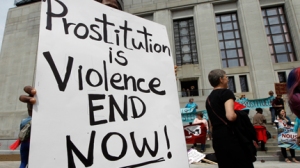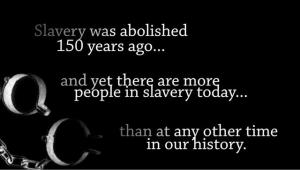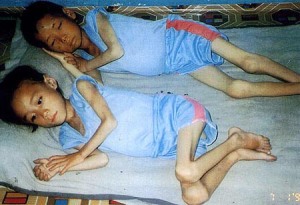modern day slavery
Facts Everyone Should Know About Human Trafficking
written by gkim
Global Human Trafficking Facts
- Human trafficking or modern day slavery describes the act of victims being subjected to involuntary servitude, forcing victims into prostitution/sexual slavery/the sex industry, and/or compelling, urging, exploiting, supporting victims to commit sexual acts for the purpose of creating pornography, online sex chats, or stripping—all through abduction, threat, deception, peonage, coercion, debt bondage, abuse of power, forced drug usage, or violence. Human trafficking not only involves sex and labor, but people are also trafficked for organ harvesting.
- According to the US Department of Justice, there are approximately 27 million to 30 million slaves today, and approximately 79% are exploited sexually, with 18% being categorized as labor trafficking.
- According to the Global Report on Trafficking in Persons by the United Nations Office of Drugs and Crime, worldwide, almost 20% of all trafficking victims are children. However, in some parts of the world such as the African or Southeast Asian regions, children are the majority (up to 100% in parts of West Africa or the Mekong Region—Thailand, Myanmar, Vietnam, Laos, Southern China, Cambodia).
- The continent of Asia is the largest supply of human trafficking industry. According to the International Labor Organization, the human trafficking industry generates about 32 billion dollars yearly. Asia contributes 9.7 billion, and 15.5 billion come from other industrialized countries.
- According to the UN Global Compact Organization, 98% of trafficked victims who are sexually exploited are women and girls. 56% of trafficked victims who are in forced labor/economic exploitation are women and girls.
- Human Trafficking is the fastest-growing business of organized crime and the third-largest criminal enterprise in the world, set to surpass drugs and arms trafficking within the next five years.
- Globally, the average cost of one slave is $90 USD.
- According to the U.S. State Department, 600,000 to 800,000 people are trafficked across international borders every year.
- Punishment for trafficking humans is lower than for trafficking drugs, and profits for trafficking humans are higher than for trafficking drugs.
- According to United Nations Children’s Fund (UNICEF), over the past 30 years, over 30 million children have been sexually exploited through human trafficking.
- Global warming and severe natural disasters have left millions homeless and impoverished, which has created desperate people easily exploited by human traffickers.
- The average age of a trafficked victim can range from 12 to 24 years old. However there are children as young as 6 years old being trafficked.
- Prostitution is illegal in 109 countries, legal in 77 countries, and restricted (selling sex is legal but organized brothels are illegal) in 11 countries. Five countries do not have any laws for prostitution. Prostitution is illegal in almost all Asian countries where human trafficking is the most significant, but laws aren’t enforced properly. Countries that have legalized prostitution in the past have seen an influx in sex trafficking. i.e. Germany, Colombia
- According to the Federal Bureau of Investigations, the majority of sex trafficking is international, with victims taken from such places as South and Southeast Asia, the former Soviet Union, Central and South America, and other less developed areas and moved to more developed ones, including Asia, the Middle East, Western Europe, and North America.
- According to the World Health Organization and US Department of State, sex trafficking plays a major role in the spreading of AIDS. HIV/AIDS represents both a cause and consequence of trafficking for sexual exploitation. Women and children may be more vulnerable to being trafficked if their family members have contracted HIV or have died from AIDS. Women and children who have been trafficked for sexual exploitation are at greater risk of exposure to HIV/AIDS. Once trafficked, women and girls who have been infected with HIV often do not have access to health care services and are deprived of any support as they are often shunned and stigmatized by their communities.
- Nine out of ten women who escape from North Korea end up being trafficked for sex. It is a destination for trafficking of children, men, and women for sex and labor.
- A human trafficker can earn 20 times what he or she paid for a girl. Provided the girl was not physically brutalized to the point of ruining her beauty, the pimp could sell her again for a greater price because he had trained her and broken her spirit, which saves future buyers the hassle. A 2003 study in the Netherlands found that, on average, a single sex slave earned her pimp at least $250,000 a year.
- Amnesty International has reported that NATO soldiers, UN police, and Western aid workers “operated with near impunity in exploiting the victims of the sex traffickers.”
- Usually, if a sex slave is arrested, she is imprisoned while her trafficker is able to buy his way out of trouble.
- According to a congressional research service report on child sex trafficking, “It is more profitable for a trafficker to prostitute a child than to commit other crimes such as dealing in drugs.” This is because “the commodity (child) is reusable” and “technological innovation has allowed traffickers to reach a wider client base and connect more quickly with buyers.”
- Forms of labor trafficking can include domestic servitude, agricultural labor, sweatshop factory labor, janitorial, food, and service industry labor, or begging.
- Labor trafficking is happening in sugar cane fields, coffee bean plantations, cacao bean harvesting for chocolate, cotton plantations, mica mines, raw iron and metal production, garment factories, brick factories, cell phone manufacturing, and coal mining.
- According to the World Health Organization, over 10,000 organs are sold ever year, translating to one organ sold every hour.
- An illegal market has capitalized on these individuals’ desperation, and the prospects of large profits are creating unfortunate incentives, with patients willing to pay up to $200,000 for a kidney. According to the WHO report, 76 percent of organs sold were kidneys, reflecting the growing demand secondary to complications of high blood pressure and diabetes.
- Doctors and other health-care practitioners, ambulance drivers and mortuary workers are often involved in organ trafficking in addition to those involved in other human trafficking networks. The organs commonly transplanted include kidney, liver, heart, lung and pancreas.
- In countries like Pakistan, China or India, a person can sell a kidney for $5,000, while those handling the transaction make a substantial profit.
- The profit for an organ trafficker is 15 times the buying price.
- According to the UN, the impact of the illegal organ trade is 75 million dollars yearly.
(Few Facts on Sex Trafficking in Korea)
- According to South Korea’s Ministry for Gender Equality and the Korean Feminist Association, there are anywhere from 500,000 to 1 million victims who are in South Korea’s sex industry today.
- According to the Korean Institute of Criminology, one-fifth of Korean men buy sex at least four times a month, and Korean men make up the largest ethnic group to seek child prostitutes in Southeast Asian countries such as Thailand, Philippines, Cambodia, and Vietnam.
- Most trafficked victims in Korea range anywhere from seven to thirty years in age. There is a decline thereafter due to the lack of demand for older women in the sex industry.
- One majority are child runaways who have been lured into the sex industry through the internet. Most child runaways have either been sexually/physically abused or confined under intense academic pressures. The other majority are native and foreign workers who have been lured with false advertisements of decent jobs over the internet or in local newspapers. Over 90% of child trafficking in South Korea occurs over the internet. Some are voluntary workers who consider the sex industry as a decent way to earn a living.
- Different reports suggest that the sex industry accounts for anywhere from 1.4% to 3% of the annual GDP in South Korea which is roughly 14 to 30 trillion Korean won (13 to 25 billion USD) a year.
- Red light districts, massage parlors, juicy bars, image bars, room salons/roombangs (hostess bars), in-call massages, out-call massages, call girl businesses, kissing rooms, lovetels (motels used for sex), karaoke bars, and night clubs are some of the venues and types of trafficking.
- South Korea prohibits trafficking for the purpose of commercial sexual exploitation, including debt bondage, through its 2004 “Act on the Punishment of Intermediating in the Sex Trade and Associated Acts.” Although this law is in place, it has not been enforced properly.
- The Ministry of Justice runs 29 “John schools,” set up to educate male “clients” of prostitution, which are one-day seminars—in lieu of criminal punishment. NGOs report that there is only one counseling center and two shelters in the country dedicated to foreign victims of sex trafficking.
7 Reasons Why Legalizing Prostitution is Not a Solution!

written by gkim
Many people and government officials argue that legalizing prostitution will solve the existing problems within the sex industry. They believe that a woman should have the right to sell her body if she wishes to do so. It’s the oldest profession in the world, and they’re legally consenting adults, they say. We can’t ever get rid of it, so might as well legalize it and provide condoms and safety for the workers. These people say they would rather have the government in control of the situation rather than the pimps, and that this gives the women more control and power.Furthermore, many girls who actually work in the industry fear they will lose their “only” source of income, so they take a very strong stance against any type of anti-prostitution activity or enforcement. Their reasoning is simply this: We are two consenting adults exchanging sex for money. We are not harming any other people in the process as long as we are practicing safe sex. This is a very skewed perception of what the sex industry and prostitution actually are. Here are seven reasons why:
I. Women who enter willingly into the sex industry do not really aspire or desire to be prostitutes. There is not one woman who is dreaming of this as her chosen profession and goal in life, fully aware of the consequences. It is usually an escape from poverty, violence, destitution, OR a lack of options in her eyes–the only way she thinks she can earn a living or maintain a type of financial stability or certain life that she desires. The woman enters thinking she will be somewhat in control. Some younger women may even verbalize that they love what they do. These typically younger women (who are not forced into the industry) try to justify their choices with a variety of different reasons such as I love sex, I’m not hurting anyone. This is my choice. Selling my body or having sex on camera is empowering. It turns me on. I love what I do. This has been my dream. I want to do this forever. These are merely public announcements. These are not the true revelations of a woman’s heart. Many of these women who enter willingly and say these things, do not enter the industry knowing the serious ramifications of what will happen to her. It is difficult to say that a woman would seek a lifestyle of selling sex for money if she knew that there was a 100% chance she would lose complete power over her life and be subjugated to humiliation, shame, rape, physical and mental abuse, torture, threats, corruption, sexually transmitted diseases, guilt, depression, or drug addictions. Almost 99% of women who have been rescued from the sex industry and women who have left on their own will have reiterated that they have been suppressed to one or more of these consequences. These thoughts will surely occur to her, but she enters thinking this will not happen to her or that she will be able to avoid it. She will quickly find out that she is trapped once she enters– trapped by the pimp, trafficker, or brothel owner. When people believe that prostitutes have chosen this life because they want to do it or because they were just born as whores, they are being deceived. All of these women are God’s precious daughters. The world may turn their backs on them, but God does not. It is up to us to help them see that they are loved.

2. Just because she is free to come and go physically, it does not mean anything, and we must remember that many are truly held from physical escape. The strongest hold on a prostitute is the mental entrapment that will dominate her life. Traffickers, pimps, and brothel owners will stop at nothing to turn a profit. One of the most common misconceptions that people have of prostitutes is that they can walk away at any time, yet they are choosing to stay in it. We must remember that almost 75% of girls who get into the industry do so as minors. Although the example I am about to give is not one of a voluntary prostitute, this is a perfect example of how one human being can influence and intimidate a young girl. Elizabeth Smart, a victim of abduction and sex slavery, was approached by police just a few months into her abduction.

She had the chance to speak up and reveal her identity, yet she was terrified that her abductors would kill her and then go after her family. She believed this with all of her heart, so she stayed quiet, and the police officer departed without suspecting anything. This type of mental control is carried out every second of the day by traffickers and pimps who view girls as their commodities. As I have said in another blog entry, don’t be fooled by smiling prostitutes. Giving a woman the right to sell her body is not giving them any type of right or freedom at all. In fact, it is the opposite of doing so.

3. Legalizing prostitution is accepting and allowing women and children of all ages to choose this as a legitimate profession. If we legalize prostitution, we are telling our sons and daughters that they can turn to prostitution as a career option when they become adults. In places like Isaan, Thailand, many children as young as five years old imagine themselves as prostitutes when they are older because it’s what they grow up seeing, and it appears to be an acceptable way to earn a living. If we do not want our own daughters to become prostitutes or become victims of trafficking, we certainly must NOT succumb to the ridiculous notion that legalizing it is better than prohibiting it. We are throwing our hands up in the air if we do this. We must strive for God’s justice to reign throughout the world no matter how difficult the fight may be or how long it may take.
4. Legalizing prostitution is not giving the government more power to oversee and protect the women. This expands the sex industry so much that it gets harder for the government to retrieve statistics and differentiate between minors and adults. Child trafficking sees an influx. It makes it acceptable for government workers to pay for sex, and it gives legal power to the pimp, trafficker, or brothel owner to become legitimate businessmen and entrepreneurs. It becomes harder for the government to provide assistance because a type of desensitization to the plight of these women occurs. Once it is legalized, new corruptions within the structure of the government evolves as they are essentially becoming the pimps. The society becomes more misogynistic. Right becomes indistinguishable from wrong. Devious and sexual acts become acceptable, and the women who are selling their bodies become subjugated to these types of acts. Additionally, there are already so many governments in the world that participate in sex tourism and sex entertainment. Corruption in such governments will increase and will not be deemed as corruption. In places like Thailand and Korea where the existing laws against prostitution aren’t enforced properly, women are forced to entertain men by engaging in deviance such as tricks with their genital muscles. Sex tourism booms in these countries, and more and more tourists who are exposed become accustomed to them and perceive them as entertainment. Imagine these types of acts becoming completely legal and protected by the law. Boundaries will become blurred and obsolete. Women will be exposed to more and more atrocity and promiscuity which will affect society as a whole.

5. Prostitution is a mask for human trafficking. The two are essentially one. If prostitution is legalized, the mask becomes thicker, and it will be able to morph into a number of different faces. Stats from countries with legalized or regulated prostitution such as Germany, Colombia, or the Netherlands have shown that human trafficking, especially of minors, has increased dramatically. The reason why prostitution can be identifiable with human trafficking is that most prostitutes who enter willingly or fight for the right to sell their bodies are so influenced, controlled, and overpowered by their pimps that they cannot leave the industry when they want to. Whether it is through mental control and brainwashing or through physical violence, these prostitutes are enslaved and kept in bondage. Most people associate bondage with a mental image of a person in chains somewhere in a dark room. This is of course the case with many, but in many cases, this is not the only type of bondage and enslavement. Many women believe that they are selling their bodies when in fact they are selling parts of their souls. They think they’re in control when they are not. Many enter voluntarily or are tricked into working and the majority cannot leave and live the lives they want to. Everything inside a human that is vital to leading a decent life in society diminishes and eventually becomes obsolete. Those who are rescued or escape from it will be internally affected for the rest of their lives. Most never come out in public, choosing to keep their stories hidden, sometimes even from their own families and husbands. Traffickers would love legalization as they would be able to hide the girls they traffick much easier. Do we really want to hand them more batons? 
6. The aftermath of prostitution is horrendous. People who have sold their bodies for money become traumatized forever. Many end up committing suicide, addicted to drugs or alcohol, depressed, suffering from anxiety, and coping with PTSD (post traumatic stress disorder). Ex-prostitutes have expressed that pieces of their souls were sold along with their bodies. The majority who do make it out of the industry have difficulties assimilating back into society because they are ridden with intense shame or stigmatized as whores. The amount of rehabilitation and health recovery is monstrous.
7. Countries that have legalized prostitution see an overall decrease in humanity, spirituality, honor, and respect in their societies. At the same time, the oppression and objectification of women as sexual objects and the permissiveness of men buying women for sex increases ten-fold. If prostitution is legalized, it becomes a business that can be marketed. The marketing would be directed not only towards men who were already interested in paying for sex but to men who would never even consider paying for sex. We condone this type of behavior if we legalize it. This leads to a decline and neglect in sanctity, values, and gender equality.
Prostitution is not something that should be regulated or legalized ever.
Facts Everyone Should Know About the Korean Perception of the Korean Sex Industry
 The Korean perception of the Korean sex industry is quite different from others. The most common statements and inquiries I seem to get from fellow Koreans are, “Well, what about the girls who enter the sex industry voluntarily when they’re adults? What about the women who do it to buy luxurious things? They say they love what they do. It’s their own choice. Should I feel sorry for them when they want to work in that industry?” To the modern day abolitionist who has done extensive research into the sex industry and trafficking, these responses could sound very typical. Unfortunately, in the Korean society, especially the Korean American society, these are valid perceptions that people will probably form. Why?
The Korean perception of the Korean sex industry is quite different from others. The most common statements and inquiries I seem to get from fellow Koreans are, “Well, what about the girls who enter the sex industry voluntarily when they’re adults? What about the women who do it to buy luxurious things? They say they love what they do. It’s their own choice. Should I feel sorry for them when they want to work in that industry?” To the modern day abolitionist who has done extensive research into the sex industry and trafficking, these responses could sound very typical. Unfortunately, in the Korean society, especially the Korean American society, these are valid perceptions that people will probably form. Why?
First of all, the bottom line is that whether entered voluntarily or forced into the sex industry, all of these human beings are victims because they are victimized in one way or another, even if some may be unaware of the victimization. Secondly, of course there are many problems to the types of statements above that mostly Koreans seem to make and believe in because not all of the girls who get into the industry voluntarily love what they do. In fact, almost every single sex worker in the industry, who has been rescued or has had the opportunity to leave on their own, has expressed or endured immense regret, shamefulness, embarrassment, stigmatization, depressive disorders, suicidal tendencies, substance abuse, mental and emotional pain, anger, resentment, self-hatred, and rejection from society. Even the prostitutes who fight for the right to sell their bodies, the most famous porn stars in the world, and the strippers who fight for the right to strip down naked all have public personas, where they say they love men, sex, and money. In reality, when they are alone, they have confessed that it is just a public persona that they must portray at all times in order to continue earning a living and keeping their guards up.
On the other hand, these skewed Korean perceptions that the sex industry workers love what they do could be seen as valid to a certain extent. The reason is because there are so many young Korean girls, who come from good families, getting into the industry willingly in Korean communities. We see them driving in super luxurious cars and living in fancy high-rise apartments, carrying and wearing expensive, fashionable items, buying whatever they want, living a normal life during the day and carrying on a secretive life in the sex industry at night. Do I believe that some of these women ruin it for the rest of the sex slaves? Yes, of course. But we cannot separate these two types of sex workers and simply label one group as greedy, sex addicts and the other as forced sex slaves. All of these women are victims of the pitfalls of the sex industry. And many who enter voluntarily end up realizing they cannot leave voluntarily when they wish to. This is not only in the physical sense. We must also understand that there are millions who are involuntarily getting into the industry as well. These women and children are forced into physical bondage as well as emotional, spiritual, and mental bondage. There are many children who escape the industry when they are adults. They have stated that these pimps and madams treat them like family and even warn them against having sex for money. Yet at the same time, they will thrust men into their lives and tell the them to get to know these men. They tell them to go after the money, not the men. Thus, the girls eventually succumb to having sex with these men for money. Sometimes, the pimps and sex establishment business owners will brainwash the child by seemingly caring for them. They will coax the child to become more and more open to devious sex acts using tactics and strategies to make them feel as if they have no other options in life. A number of these victims develop Stockholm Syndrome, which is a psychological effect where hostages and victims develop sympathy and affection towards their traffickers and pimps.
It is much worse for a child who enters voluntarily or who is trafficked against his/her own will into the sex industry. The traction and mind control that a trafficker has over a young child can be very manipulative and atrocious. Many times, traffickers threaten these victims saying that they will be killed, mutilated, and stuffed in the gutter if they pursue an escape from the industry. I have beeThere are also instances where these sex slaves are forcefully given drugs so that when they are eventually rescued, they actually end up going back to the brothels on their own due to the stronghold of the drugs which are overpowering their lives. These girls are being exploited in every which way possible, and the men who frequent these types of establishments either don’t care or are unaware. Let’s make them care! Let’s spread awareness! Even room salons (room bangs) or hostess bars which appear harmless are actually refined brothels. Many of these women who work in these types of establishments in the States are tricked and trafficked into the States under false identities. There is also a growing trend of American women who are getting into this industry for the “quick and easy” money.
Remember–just because there’s a happy-looking girl acting like she wants to have sex with a customer or even stating that she loves her job, nine out of ten times, this is a façade.
This also trickles into the porn industry as well as strip clubs and online sex chat rooms. Sexual exploitation makes up 79% of human trafficking, including forced stripping, pornography, massage services, and prostitution. Behind closed doors, these sex slaves live in terror, shame, guilt, fear, and without any hope. They are the most vulnerable humans on Earth. We must spread the word to help stop this injustice from continuing on! The complete abolition of sex trafficking in our lifetime is imperative and affects each and every person in the world today.






You must be logged in to post a comment.